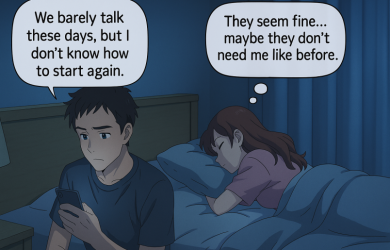What to Do When You Are Craving Emotional Intimacy

Heal & Grow Daily for a Happier Relationship
Subscribe FREEKey Takeaways
Marriage.com AI Quick Summary
One of the most frequent reasons couples seek marriage therapy is a sense that they are drifting apart. “We just don’t seem to have much in common outside the children anymore,” they say. This sense of isolation from your partner is a sign that you need to rebuild your bond of emotional intimacy.
The benefits of emotional intimacy for a couple are numerous: it helps strengthen and feed your sexual intimacy, creates an atmosphere of security and safety between you both and allows you to fulfill that human need to feel a deep connection with someone close to you.
Dionne Eleanor, Relationship & Empowerment Mentor, states,
Emotional intimacy is the primary root that sustains all other connections in a relationship; without it, the relationship may wither.
Without emotional intimacy, our relationships, no matter how loving, may feel incomplete. This can lead to emptiness and isolation, which can eventually build to resentment and a nagging feeling of disconnect.
For a marriage to truly feel whole and meaningful, love is not enough. You want to examine how you can create and deepen emotional intimacy by giving, receiving, planning, collaborating, loving, and desiring within the context of your relationship.
Dionne Eleanor further adds,
Intimacy grows when you allow yourself to be vulnerable, trusting that your partner will hold your truth with care.
If you are craving emotional intimacy, here are some ways to build it:
Take this in small steps
Start by sharing thoughts and ideas with your partner. You may have lost this due to your busy lives. Carve out some dedicated time each evening to truly connect. This is called intellectual intimacy. Once you’re comfortable with that, move on to shared feelings, then shared physical contact.
Take as much time as you need moving through these steps. Identify which types of sharing make you uncomfortable and talk openly with your partner about why. Be sure to also highlight which types of sharing make you feel closer to your partner, as these will be the ones you want to enhance.
Start by loving yourself
Why do we want to begin with this? Because if you constantly seek your self-affirmation by looking towards your partner, you are asking too much of them and setting yourself up for disappointment. Recognize that you are a good person, deserving of quality love. You are enough.
Be mindful of taking care of your own emotional and mental health. When two people feel good about themselves, they make a dynamite couple capable of forming a strong emotional bond. They are not looking to the other to fulfill their emotional needs. They’ve got everything they need within.
Dionne Eleanor, Relationship & Empowerment Mentor, mentions,
Self-love is the soil where emotional intimacy takes root, and from there, it flourishes in your relationship.
Know what your own emotional needs
When you know your own emotional needs, you can better communicate them to your spouse. Your list may include: being seen and heard, feeling supported and encouraged, being admired and respected, sexual and non-sexual touching, hearing expressions of gratitude from your partner, collaborating on decisions.
Dionne Eleanor comments,
Clarity about your emotional needs brings transparency, making it easier for both partners to nurture the relationship.
Live in a state of trust
For emotional intimacy to develop, you must deeply trust your partner. Rid your mind of any behavior you might have practiced in the past that prevented you from trusting your spouse 100%. Fear of betrayal will negate any growth of emotional intimacy, so get yourself in a mental frame of mind where trust is a given and you never have cause to doubt your partner.
Live in a state of positivity
Your default should be that you always have your partner’s best interests at heart. Emotional intimacy cannot exist if you think your partner is sabotaging you deliberately, or doing things to intentionally hurt you. Part of living positively is assuming the inherent goodness of your partner and his acts.
Work continually on your communication skills
In a healthy relationship, you want to have the freedom to convey your needs, ask what your partner wants from you and accept when you make mistakes without blaming your partner. If you can master this, you’ll raise the bar for trust, respect, and communication.
Banish negativity
You and your spouse will do things that annoy each other. But you are in control of how you react to these things. Did he forget to take the recycling to the curb once again? Breathe deeply and think about how you want to address this. Your old ways may have had you saying “I can’t believe I have to ask you once again to take out the recyclables! You are a grown man! Why can’t you remember to do this?” Emotionally intimate couples might use a different way of addressing this: “What can we do so you remember to take the recyclables to the curb each Tuesday? What do you think about a post-it on the calendar?” The first approach is adversarial; the second shows a spirit of cooperation and is not a personal attack. Always be caring, kind and compassionate with each other.
Signs that show you’ve achieved a good level of emotional intimacy with your partner:
- My partner completely accepts me as I am
- I can openly share my deepest thoughts and feelings with my partner
- My partner cares deeply for me
- My partner can be counted on to help me in any way
- My thoughts and emotions are understood and validated by my partner
If you are craving emotional intimacy in your marriage, you need to pay attention to this feeling. It is telling you that you have some work to do. And that work—building a stronger emotional bond with your spouse—is important to sustaining a happy healthy relationship. Use some of these tips to get you started on the path to a more emotionally intimate relationship.
 Tips
Tips
Write your tip or submit a video tip
All tips are reviewed before the publishing.
Share this article on
Recent Articles
Related Quizzes
Heal & Grow Daily for a Happier, Healthier Relationship
Subscribe FREE on YouTube We'd love your feedback!
We'd love your feedback!
 Expert Q&A
Expert Q&A
Ask your question related to this topic & get the support you deserve from experts.





















 Thanks for your feedback!
Thanks for your feedback!